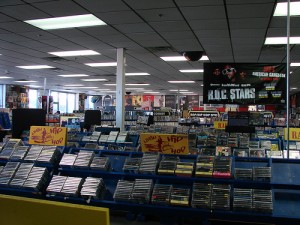Music Today and How It Has Changed Drastically in the Industry: Are We Musicians in the New Wild West?
By Kaylene Peoples | October 26th, 2010 | Category: Indie Hotspot, Tips and Advice | 2 comments I’ve been hearing disheartening rumors for some time now that the music industry as we have known it is dead. The days of signing a new band, cultivating them, and developing their following, marketing, and promoting them are over. A very small percentage of musicians will ever see enough money to pay a mortgage, let alone buy a house these days. Back in the 50s through the 90s the music industry was fruitful, and many acts have come and gone selling Gold and Platinum. But these recording artists were doled out opportunities that are now extinct. Nowadays, for a new band to get presented a record deal, they had better do the hard work first—sell 200,000 units on their own, create their own fan base, get their own radio airplay, record their own music, and produce/finance their own videos. After they do all the hard work, then the label swoops in like a hawk and preys on them unsuspectingly.
I’ve been hearing disheartening rumors for some time now that the music industry as we have known it is dead. The days of signing a new band, cultivating them, and developing their following, marketing, and promoting them are over. A very small percentage of musicians will ever see enough money to pay a mortgage, let alone buy a house these days. Back in the 50s through the 90s the music industry was fruitful, and many acts have come and gone selling Gold and Platinum. But these recording artists were doled out opportunities that are now extinct. Nowadays, for a new band to get presented a record deal, they had better do the hard work first—sell 200,000 units on their own, create their own fan base, get their own radio airplay, record their own music, and produce/finance their own videos. After they do all the hard work, then the label swoops in like a hawk and preys on them unsuspectingly.
The other night I attended the Nickelback concert at the Honda Center in Anaheim. While at the after party, I ran into an entertainment professional, Sean-E Demott, who is the Head of Content for Guvera, has headed up A&R for Republic Records, manages and consults and advises for loudbytes (http://www.loudbytes.com). He just recently spoke at a symposium on the evolution of media in the digital world (http://www.bmi.com/panel).
Interviewed by Kaylene Peoples (boldface)
Responses by Sean-E Demott
Sean-E, could you share with our readers the direction the music industry is headed?
I just spoke on a panel at  Digital Hollywood. My specialty was intellectual property. Guvera made a blanket deal with Universal, EMI, INgrooves (www.ingrooves.com), and The Orchard (www.theorchard.com). We have about 4 million songs on our site and about 125,000 users. You can come to the site and get music for free, but the artist gets paid by companies like McDonald’s, Sprite, Levi’s, etc. We get money from corporate sponsors, and they open up their own station or channel on the website. You can come and get the new Lady Gaga song and get Levi’s or Sprite to pay for it, and you the artist get paid the exact same way that you would on iTunes, except that the consumer gets it for free. Since everyone is getting music on the bit torrent sites, our motto is, “Take it from us for free and we pay,” but the guy who’s really writing the check is the advertisers.
Digital Hollywood. My specialty was intellectual property. Guvera made a blanket deal with Universal, EMI, INgrooves (www.ingrooves.com), and The Orchard (www.theorchard.com). We have about 4 million songs on our site and about 125,000 users. You can come to the site and get music for free, but the artist gets paid by companies like McDonald’s, Sprite, Levi’s, etc. We get money from corporate sponsors, and they open up their own station or channel on the website. You can come and get the new Lady Gaga song and get Levi’s or Sprite to pay for it, and you the artist get paid the exact same way that you would on iTunes, except that the consumer gets it for free. Since everyone is getting music on the bit torrent sites, our motto is, “Take it from us for free and we pay,” but the guy who’s really writing the check is the advertisers.
What is loudbyte and how does it work?
With loudbyte, I’m putting code and scanning intellectual property on tangible property. So for example, you could take a band like Green Day and buy a designer’s shirt and with the hat, you get the record, which comes on the hat. You buy the shirt at the cash register, and for an extra $5 or $6, whatever the margin is, you take it home, put in the code, and you just got the new green day record, which has just been sound scanned off the shirt. I think if the companies start putting intellectual property on tangible property (if you have an imagination), they’ll see the sky is the limit.
 But what about the retail outlets like Target and Best Buy that stock CDs—the Big-box stores?
But what about the retail outlets like Target and Best Buy that stock CDs—the Big-box stores?
With Best Buy looking at their watch on when they want to kick out plastic out of their stores, they can’t wait to get rid of CDs. They’re either going to kick it out or because they’re the number two Big-box chain of music in the United States, they could start telling all the major record labels that they want to start retailing CDs for 8 or 9 bucks and the labels will have no choice but to comply. The labels put all their Tower Records and merchants out of business by whoring their artists out to all the Big-boxes. The Big-boxes put the real music stores out of business, and now Big-boxes have all the leverage. The record labels have shot themselves in the foot because they cannibalized their own action.
How can this knowledge help the indie musician? Any tips?
Tunecore (www.tunecore.com) and Topspin (www.topspinmedia.com) have set up a platform for the indie musician. There are bands like Blood on the Dance Floor who have sold 250,000 – 300,000 units. Picture some guy from Capitol Records saying he wants to sign them. What can they even offer that band? They can’t offer to sell CDs or do promotion. The band is doing all that already on its own. The only way for a label to appeal to a band that is doing well on its own now is by offering a big obnoxious check.
So what about the poor little indie bands that only sell 1,000 units a year, if that?
If you’re an indie band, you have more opportunity now to do things than ever before. It’s like a good and bad scenario. It’s the Wild West for making it happen on your own.
So the persons who can think the most outside of the b ox and are the cleverest could succeed if they do it right?
ox and are the cleverest could succeed if they do it right?
The best thing for an indie band right now to be successful is to NOT be in a deal. They have a hit on the radio, or to have a hit on the internet or to have some real tangible activities going on. You’re either going to make the highest margins on your own business, or you’re going to wait around for some dude to come and @#!! you for a lot of money.
So the days of the record deal are over?
The deals are all 360 deals.
What is that?
The label wants to be involved in all 360 degrees of your action. In the past it was them giving the artist money and wanting a piece of the masters. That used to be their business model. Since they can’t sell CDs anymore (nobody wants them—it’s done). If I was a manager of a band now and Atlantic Records called offering a deal, they would want to be partners on the publishing, merchandise, touring, and anything and everything the band is and will be doing. The label can’t even offer them touring aid because there is no touring department or even a publishing department. They can offer nothing. But they want to reach into all of these revenue streams without providing any departments to support them.
Let’s take me, for instance—I’m a jazz artist—any advice for somebody in my genre?
It’s a model for all. You can go do it on your own. You have to run it like a business. There are way higher margins when you do it on your own. The oldest story in the book is the young artist that either doesn’t have the money, maybe isn’t as clever, or no real business sense, and they don’t have the resources to blow their stuff up. At the end of the day, at this point, it’s a lot of companies that are going under. Pepsi, Mountain Dew, Levi’s, Grey Goose . . . all of these companies I just mentioned could easily take over the music industry in a month! They penetrate more retail and reach more consumers than anyone ever did at Capitol Records. If you marketed for Pepsi right now, you could take over the music industry in 12 months. These household brands don’t even realize it.
Visit www.thepublicrecord.com to learn more about what Sean-E is working on to help change the face of the music industry.









[…] more here: http://www.agendamag.com/content/2010/10/music-today-and-how-it-has-changed-drastically-in-the-indus… Share this:FacebookEmail Categories: Interviews, Reviews & […]
[…] Reposted from Agenda Magazine […]